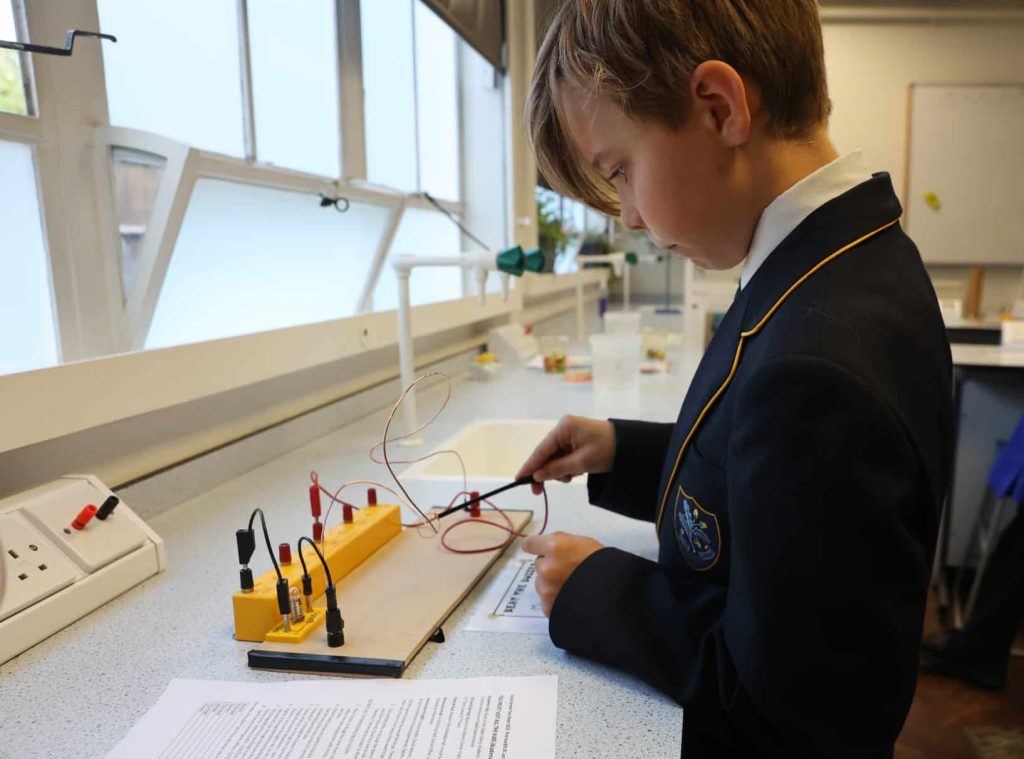Physics at Forest School
Head of Department: Phil Aspery ptsa@forest.org.uk
Pupils will have access to some of the best equipment found across schools in the UK, enriching their classroom learning with practical opportunities both within and beyond the specification. Students will be fully supported by the Physics department along their journey from Year 9 to Year 13, with regular support clinics and intervention.
Our rich curriculum includes:
- British Physics Olympiad Challenges in Y10 and Y11, Engineering Society
- ORBYTS, Engineering Society
- ‘Physics in Action’ lectures, various Physics Olympiads
- Academic stretch sessions for sixth form students applying for scientifically rigorous university courses
GCSE and A-level Overview
The Edexcel IGCSE or IGCSE Double Award Science in Physics qualification enables students to:
- Acquire knowledge and understanding of physical facts, terminology, concepts, principles and practical techniques and apply them to different contexts
- appreciate the practical nature of physics, developing experimental and investigative skills, correct and safe laboratory techniques, analysis, interpretation and evaluation of data and experimental methods, drawing conclusions, and understanding the importance of accurate experimental work
- develop a logical approach to problem solving in a wider context, and to select, organise and present relevant information clearly and logically using appropriate vocabulary, definitions and conventions
The Edexcel A Level in Physics qualification enables students to:
- Essential knowledge and understanding of different areas of the subject and how they relate to each other
- A deep appreciation of the skills, knowledge and understanding of scientific methods
- Competence and confidence in a variety of practical, mathematical and problem solving skills
- Their interest in and enthusiasm for the subject, including developing an interest in further study and careers associated with the subject
- An understanding of how society makes decisions about scientific issues and how the sciences contribute to society
Assessment at GCSE and A-level
GCSE:
- IGCSE Biology = two written examinations (Paper 1 and 2) – 120-minute (110 marks) exam and one 75-minute (70 marks) exam. Students will gain one GCSE in Physics.
- IGCSE Double Award Science = three written examinations (Biology, Chemistry and Physics) – 120-minute (110 marks – 33.33% per exam). Students will gain two GCSEs in Science.
A Level:
- Advanced Physics 1 – 90 marks, 1 hr 45 min, written paper (30% of the total grade).
- Advanced Physics 2 – 90 marks, 1 hr 45 min, written paper (30%).
- General and Practical Principles in Physics – 120 marks, 2 hr 30 min, written paper (40%).
- Students will also be assessed on their practical competency in the Practical Endorsement in Physics, which is a separate certificate from the A Level grade.
How can Physics change the world?
Without Physics there would be no television, no internet, no computers, no smart phones, no X-ray machines to diagnose illness, nor radio-isotopes manufactured to cure them, no motorised road, rail, air or space travel, no knowledge of atoms, no understanding of the universe beyond our planet, nor even a clear understanding that we live on one, nor how it came to exist. The scientific method, and our understanding of what we are made of and the laws that govern all matter and energy, have changed the world we live in and will continue to shape the future in ways we can only imagine.


